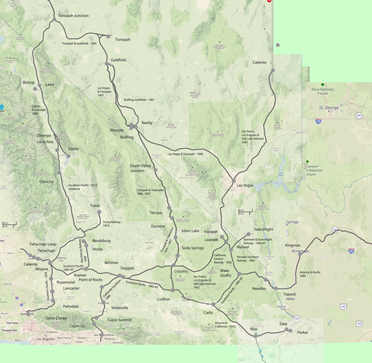Bullfrog Goldfield Railroad

Bullfrog Goldfield Railroad
The Bullfrog Goldfield line was built south from Goldfield to Beatty and Rhyolite beginning in May 1906. The line closed in January 1928 but went through five management changes in its short life.
Title: Exploring the Legacy of Bullfrog Goldfield Railroad
Introduction:
The Bullfrog Goldfield Railroad holds a significant place in American history, especially in the context of the gold rush era. Serving as a lifeline for the mining towns of Bullfrog and Goldfield in Nevada, this railroad played a crucial role in transporting people and resources across the region. In this blog post, we will delve into the fascinating history and legacy of the Bullfrog Goldfield Railroad.
1. The Birth of Bullfrog Goldfield Railroad:
The story of the Bullfrog Goldfield Railroad begins in the early 20th century when gold was discovered in the Bullfrog Hills of Nevada. With the mining industry booming, the need for a reliable transportation system became evident. In 1905, the Bullfrog Goldfield Railroad Company was established to address this growing demand.
2. Expansion and Construction: To connect the mining towns of Bullfrog and Goldfield, the Bullfrog Goldfield Railroad embarked on an ambitious construction project. The railroad stretched approximately 80 miles, cutting through the rugged desert terrain of Nevada. The construction process was not without its challenges, including extreme weather conditions, limited resources, and logistical hurdles. However, the perseverance of the workers prevailed, and the railroad was completed in 1906.
3. Role in the Gold Rush Era:
During the gold rush era, the Bullfrog Goldfield Railroad played a pivotal role in facilitating the movement of people and goods. The railroad primarily transported gold ore, machinery, and supplies between the mining towns and other nearby cities. It significantly reduced the transportation time and costs, making the mining operations more efficient.
4. Decline and Closure:
Despite its initial success, the Bullfrog Goldfield Railroad faced challenges as the gold rush gradually declined. With the decrease in mining activities, the demand for transportation services decreased as well. As a result, the railroad struggled to sustain itself financially. In 1918, the Bullfrog Goldfield Railroad ceased its operations, marking the end of an era.
5. Legacy and Preservation:
Although the Bullfrog Goldfield Railroad is no longer active, its legacy lives on. Today, remnants of the railroad, including tracks, tunnels, and stations, can still be found in the Nevada desert. These remnants serve as a testament to the ingenuity and determination of those who built and operated the railroad. Efforts have been made to preserve and restore these historical sites, allowing visitors to explore and learn about the rich history of the Bullfrog Goldfield Railroad.
Conclusion:
The Bullfrog Goldfield Railroad played a significant role in the development of the mining towns of Bullfrog and Goldfield during the gold rush era. While it may no longer be in operation, its impact on the region's history cannot be understated. The railroad's construction and operation showcased the resilience and perseverance of those involved. Today, the remnants of the Bullfrog Goldfield Railroad serve as a reminder of the challenges faced and the legacy left behind by this remarkable transportation system.

Tonopah, Nevada
Goldfield, Nevada
Bullfrog, Nevada

